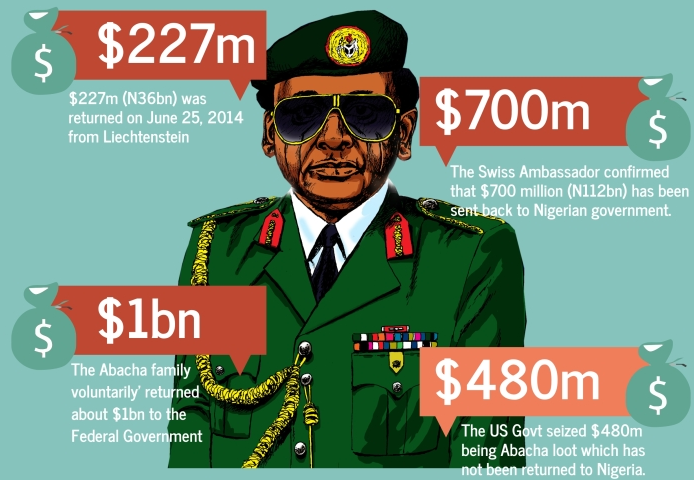- Abacha Loot: Swiss Lawyer Tackles AGF over N7bn Legal Fees
The Swiss lawyer hired by Nigeria to recover late Sani Abacha’s loot, Enrico Monfrini, has disclosed that the Attorney-General of the Federation (AGF) and Minister of Justice, Abubakar Malami, is trying to change the facts on the $321 million recovered from Luxembourg.
The Cable had reported how Malami engaged two Nigerian lawyers, Oladipo Okpeseyi and Temitope Adebayo, for a fee of $17 million to do a job already completed by Monfrini.
In an interview with New Telegraph on August 26, Malami, questioning the services of Monfrini, alleged that the President Goodluck Jonathan administration agreed to pay Monfrini 20 to 30 per cent as his fees before the final repatriation of the money to Nigeria-an idea the AGF said the President Muhammadu Buhari administration frowns at.
“And he was indeed paid an amount which was not clear as to the concept and extent of what services he rendered whether this $321 million was part of his facilitation. But a point of interest is that as at the time this government came in, the $321 million was not paid by the Swiss Government,” Malami said in the interview.
Speaking with The Cable, however, Monfrini, a world renowned lawyer, said Malami has chosen to publicly make allegations and statements which tend to smear his reputation.
“I read the content of the article published by the New Telegraph on August 26, 2018, in which Malami is trying through lengthy statements to get people to believe different facts which are, to say the least, untrue,” he said.
Before President Buhari came into office, the Swiss lawyer said he had never heard of any professional fees “of 10 to 20 per cent” paid to lawyers.
According to him, “As far as I am concerned, my fees were always fixed at five per cent or most of the time substantially lower. If one comes to the matter of the $321,000,000, I want to strongly stress the fact that this money was not what Malami calls ‘part of my facilitation.’ It was the money which had illegally been received by some members of the Abacha’s family which I had started to search for as of September 1999; found through researches operated by my firm and myself in Luxembourg in 2000; frozen in said country and finally forfeited thanks to my intervention in Switzerland in December 2014.
“I do not consider that all the enormous work invested by my firm and I in this matter could possibly be quoted as ‘facilitation’.”
Malami, in the interview, said Monfrini was considered to be among others for the recovery of the $321 million, but he was asking for 20 to 30 percent as against the conventional five per cent approved by the federal government.
He said he had, however, convinced Buhari on a 10 to 15 per cent pay for the Swiss lawyer, but Monfrini rejected, insisting on 20 to 30 percent cut, which the president was not going to approve.
“It was against this background that a consortium of lawyers of Nigerian origin now submitted their proposals, and we accepted their letters and they swung into action,” he said, adding that he had already proposed to the ministry of finance for the Nigerian lawyers to be paid a five percent cut from $321 million.
But Monfrini insisted he had already completed this job, and his fees, in about 20 years recovering Abacha’s loot, was around five per cent.
“I sternly deny having ever asked Malami or any other public officers of the Federal Republic of Nigeria to pay me anything more than the five per cent I was entitled to.
“I also have to repeat that the payment of my fees happened in December 2014 upon receipt by the Geneva Attorney General of $321,000,000 paid by the government of Luxembourg thanks to my intervention.
“It’s equivalently false to state, as Malami does, that at the time this government came in, the $321,000,000 was not paid by the Swiss Government as it was the subject of judicial pending before a court, therefore, to write that this situation was ‘the crux of the matter’ is so untrue that it becomes laughable.
“The truth is that the money was available to the government of Nigeria as early as December 2014, and as I said before, the matter for which Malami chose to appoint two new Nigerian lawyers for fees exceeding $17,000,000 could have been done in writing a letter to the Geneva Attorney General or to the government of Switzerland requesting the money to be paid back to Nigeria. Again, such activity is not to be developed by lawyers but only through diplomatic consultations between States,” he clarified.

 Education4 weeks ago
Education4 weeks ago
 News3 weeks ago
News3 weeks ago
 Business3 weeks ago
Business3 weeks ago
 Technology3 weeks ago
Technology3 weeks ago
 Investment4 weeks ago
Investment4 weeks ago
 Investment3 weeks ago
Investment3 weeks ago
 Telecommunications4 weeks ago
Telecommunications4 weeks ago
 Banking Sector3 weeks ago
Banking Sector3 weeks ago






























